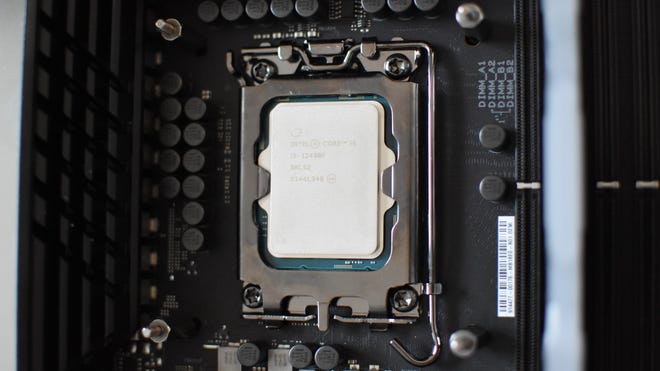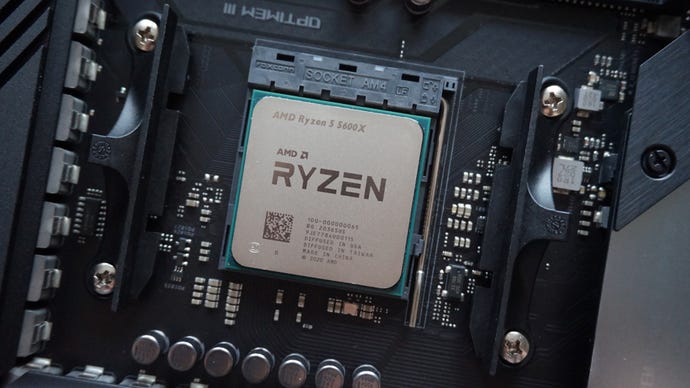Best CPU for gaming 2023: the top Intel and AMD processors
Our recommended CPU picks
Even with a convenient guide to best gaming CPUs, picking out a new processor will invariably require some thought. Maybe even some chinstroking. Besides the need to pair your desired chip with a compatible motherboard and RAM, modern CPUs have tangled themselves up in a dense snarl of mathematical naming conventions and increasingly bewildering variations of core and thread counts. A situation that’s unlikely to be helped by Intel’s Core rebrand.
This guide aims to take the brow-furrowing out of buying a central processor, by narrowing things down to a select handful of only the best CPUs that’s we’ve tested in games. Because while there are sexier PC upgrades, keeping this particular part up to date is worth doing: even if it’s not a 24-core gigabrain, a good CPU can and will boost gaming performance, especially when it can unlock the full power of your graphics card.
Marrying a strong GPU to a weak CPU might seem like you’re prioritising the right component for games, but there needs to be balance between the two to avoid bottlenecking. This is particularly the case at less demanding resolutions like 1080p, where higher-end graphics cards can really open the taps – but only when the CPU can keep up.
I’ve updated this list to have something for everyone, from affordable chips that offer a great bang:buck ratio to extreme CPUs that can turn your gaming rig into a multitalented watercooled workstation. All of them are worth buying – again, you’ll just need to make sure you also have the right motherboard in which to install your new CPU. A short version for recent models: Intel 12th and 13th gen chips use the LGA 1700 socket and work with Intel 600 or 700 series mobo chipsets, while Ryzen 7000 chips fit in the AM5 socket and use AMD 600 series chipsets.
Best CPU for gaming 2023
- Intel Core i5-13600K- the best Intel GPU for gaming, and the best CPU for gaming overall
- AMD Ryzen 7 7700 - the best AMD CPU for gaming
- Intel Core i5-12400F - the best budget Intel CPU for gaming
- AMD Ryzen 5 5600X - the best budget AMD CPU for gaming
- Intel Core i9-13900K - the best high-end CPU for gaming
Intel Core i5-13600K
The best Intel CPU for gaming, and the best CPU for gaming overall
Ahem. If you read the Intel Core i5-13600K review linked below, you’ll mainly witness me being underwhelmed by how little progress it makes over the previous-gen Core i5-12600K. Still, times change, as do prices, meaning Intel’s newer mid-range champion is now available for a much fairer, more attainable outlay – even to the point where I would now recommend it over its predecessor. As such I’m promoting it from "Fast but just get the old one" to "literally the best gaming CPU". Good for it.
In all seriousness, this is an intensely powerful gaming CPU for the money, which (for all my moaning) does make numerous improvements on the excellent Core i5-12600K. It’s significantly faster in CPU-sensitive games like Assassin’s Creed Valhalla, and its much higher core and thread counts give it a major upgrade to everyday desktop computing and multitasking.
Unlike the similarly speedy AMD Ryzen 7 7700, Intel’s chip also works with both DDR5 and DDR4 memory. So if you’re upgrading from a DDR4 system and don’t feel like spending yet more cash on new RAM, you can use your existing sticks; it’s just the motherboard that will need replacing.
Read more in our Intel Core i5-13600K review
AMD Ryzen 7 7700
The best AMD CPU for gaming
Normally it’s the Ryzen 5 lineup that competes with Intel’s Core i5 models, but it’s the AMD Ryzen 7 7700 that comes closest to matching the Core i5-13600K on gaming performance and value. The two CPUs are essentially the same price, and consistently came within 1-3fps of each other in my game benchmarks.
To put it another way, the Ryzen 7 7700 is a splendid CPU for playing at all resolutions, and it earns some bonus points for equalling the Core i5-13600K while being much more power-efficient. Its base TDP is rated at a mere 65W, nearly half that of the Intel chip. It’s mainly just the hard DDR5 requirement and lower multitasking performance (the Ryzen 7 7700 scored 7341 in Cinebench R20, to the Core i5-13600K’s 9252) holding it back from the overall top spot. It’s still a great pick if you want to stick to AMD hardware.
Why, though, get this and not the Ryzen 7 7700X? The X-rated version does have even higher clock speeds, but only the same number of cores/threads, while its base power consumption is far higher at 105W. There might be a small performance advantage but the Ryzen 7 7700’s higher efficiency and lower price ultimately make it the more appealing option.
Intel Core i5-12400F
The best budget Intel CPU for gaming

Even if the Intel Core i5-12400F predates Intel’s most recent gaming CPU generation, it remains a potent mid-range gaming CPU, and will cost you much less than the brand new alternatives. In my benchmarks it performed either on par with, or only slightly behind, the Core i5-12600K – meaning it’s also very close behind the newer Core i5-13600K, while comfortably outpacing fellow thrift option the Ryzen 5 5600X.
Like all of Intel’s F-suffixed processors, the i5-12400F isn’t unlocked for overclocking. But that’s fine if you’re not interested in such manual tweakery, and in a way it would be a shame to compromise the low temperatures and power usage – qualities that leave it able to run quite happily under a cheap air cooler.
The Core i5-12400F is especially ideal for those who want their gaming to PC to just play games. It lacks the additional Efficiency cores, or E-cores, that more premium Intel 12th and 13th gen chips possess – not a problem for games, which prefer the standard P-cores (Performance cores), though E-cores are useful for streaming or heavy multitasking. Still, there’s always the Core i5-13600K if you want that capability.
Read more in our Intel Core i5-12400F review
AMD Ryzen 5 5600X
The best budget AMD CPU for gaming

Another previous-gen CPU in a list of the best? Maybe it’s not as daft as it sounds. True budget CPUs tend to make major sacrifices to clock speeds and core counts, making them difficult to recommend for all but dirt-cheap PC builds from deep within the darkest bargain basements. With some help from Father Time, however, much more capable mid-range CPUs can slide into an entry-level price range. So it is with the AMD Ryzen 5 5600X, formerly one of the absolute best gaming CPUs on the market and now a super-affordable wild card.
While CPUs like the Core i5-13600K are clearly faster, the Ryzen 5 5600X’s gaming performance still stands up: it averaged 189fps in our 1080p/RTX 2080 Ti Hitman 3 benchmark, proving that it can let luxury graphics cards run free with minimal bottlenecking. For comparison, the mighty Intel Core i9-13900K produced 208fps, so you’d need eagle eyes and a 240Hz gaming monitor to tell the difference.
The main catch is not its own speed, but that the Ryzen 5 5600X doesn’t support PCIe 5.0 – making it less future-proof than a Ryzen 7000 series chip, or any of Intel’s CPUs from the 12th generation or later. For now, though, I wouldn’t say that spoils it. PCIe 5.0 SSDs are currently few in number and preposterously expensive, so wouldn’t even be good matches for a budget build, and graphics cards aren’t yet taking advantage of the PCIe 5.0 interface at all.
Read more in our AMD Ryzen 5 5600X review
Intel Core i9-13900K
The best high-end CPU for gaming
The uncomfortable truth of hyper-premium CPUs like the Intel Core i9-13900K is that, for gaming specifically, they’re usually overkill. Games still only take advantage of a handful of cores and threads, so having multiple dozens of each isn’t of great use: at 1080p and with an RTX 2080 Ti, this chip averaged 112fps, which looks great until you see that the Core i5 13600K managed 106fps. A difference of barely 5%. There’s also the inevitably high heat buildup, which forces you into equipping a costly watercooling unit even if the chip is only running at stock speeds.
Why have the Core i9-13900K here at all, then? Well, it does have its uses. Its Cinebench R20 multicore result of 15,024 is miles ahead of anything else we’ve tested, with even the souped-up Core i9-12900KS in the dust at 11,019. Pair this CPU up with a good amount of RAM, and you’ve got a PC that can handle just about anything, from 4K streaming to video encoding and hardcore multitasking.
When you consider that a gaming PC doesn’t need to be limited to playing games, processors like the Core i9-13900K start to make a lot more sense. And, frankly, if you’re going to spend this much on a single component, you’d best demand that it can be as all-singing and all-dancing as this one.
Frequently asked questions
Should I get an Intel or AMD CPU?
When it comes to CPUs, I first recommend expunging any notions of brand loyalty from your head and simply choosing the individual chip that best suits your performance needs and budget – regardless of who makes it.
That being said, there have been times when one manufacturer’s catalogue of chips has been broadly more compelling than the other’s. Right now, AMD and Intel are trading blows quite evenly, but there are key differences in their approaches. Starting from their 12th Gen parts, Intel have focused on maximising core and thread counts, introducing a hybrid system of high-speed Performance cores and weaker but less power-hungry Efficiency cores. The resulting CPUs have proven great for both gaming and desktop multitasking, though AMD’s focus on raising clock speeds has helped them keep pace in games. Ryzen chips tend to be more efficient than their Intel counterparts, too.
Should I overclock my CPU?
Manual overclocking involves considering far more than just how high you set the clock speeds. OC’d chips use more power and generate more heat, so you’ll need to make sure you have a sufficiently powerful air or watercooler to keep temperatures under control. You’ll also need to specifically buy a processor that’s been "unlocked" for overclocking, and at least with Intel CPUs, these are more expensive than the locked versions. Finally, there’s the process itself: finding the exact balance where you’re overclocking enough to get a meaningful performance boost, but without going so far as to make your system unstable, can take a lot of trial and error.
Basically, be sure you know what you’re getting into before you try overclocking. If you’re fully equipped and have taken the time to find that ideal balance, however, overclocking can absolutely be worthwhile. It’s a way to squeeze some extra speed out of your PC at no additional cost, and isn’t as dangerous as it might sometimes sound. Your PC will detect if it’s running too hot, or with unstable power flow, and shut itself down before any real damage is dealt. If that happens, you just need to lower your clock speeds and/or voltages and try again.
What is CPU bottlenecking, exactly?
When running games, both your CPU and your graphics card will be constantly busy processing data. CPU bottlenecking occurs when the central processor can’t match the processing pace of the GPU, which in turn blocks the latter from being able to get as much work done as it could if the whole system was running unimpeded. You can use monitoring software like MSI Afterburner to check if this is happening on your PC: high CPU load but low GPU load probably means a CPU bottleneck. Overclocking can help with this, but for serious power mismatches, a full CPU upgrade may be necessary.
Likewise, GPU bottlenecking can occur when the CPU is processing data much faster than the graphics card, though this can be fixed by lowering the game’s graphics quality settings or switching to a lower display resolution.





